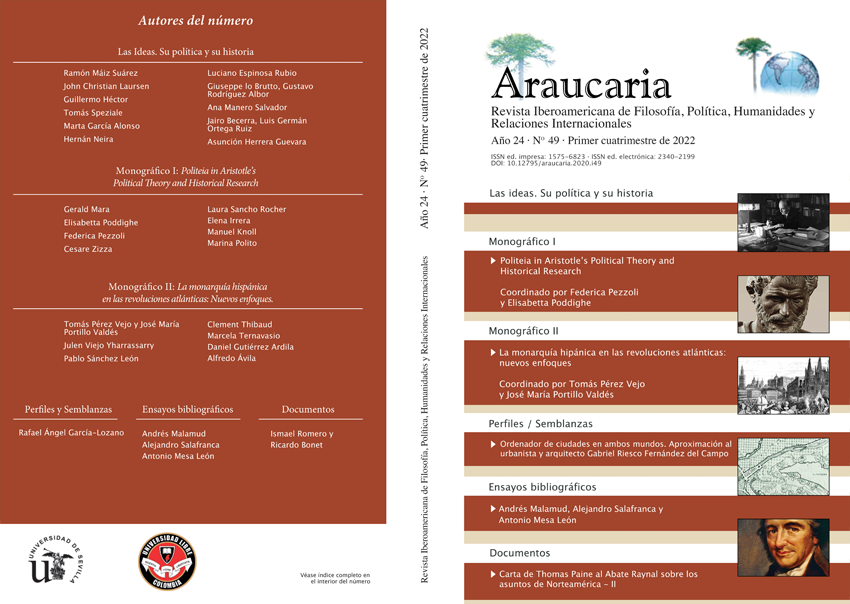Aristotle’s Politeia of the Carthaginians
DOI:
https://doi.org/10.12795.15Keywords:
Aristotle’s Politics Book 2, Carthage, politeia, non-Greeks, best regime (ariste politeia), Aristotle’s PoliteiaiAbstract
One aspect of Book 2 of Aristotle’s Politics that has drawn the most attention among scholars is his discussion of the politeia of Carthage, a non-Greek political community. Bearing in mind this unconventional decision, my paper will firstly focus on the reasons that led Aristotle to include this regime by adopting the conceptual category of politeia: this, in fact, allows him to analyze political phenomena that meet a series of prerequisites and are not exclusively related with the Greek world. Secondly, I will concentrate on the criteria used by the philosopher to determine whether or not the Carthaginians’ political order actually worked, showing that these criteria come mainly from the ‘empirical’ Books (4-6) of Politics.
Downloads
References
Accattino 1986: P. Accattino, L’anatomia della città nella Politica di Aristotele, Torino, 1986.
Aubonnet 1960: J. Aubonnet, Aristote. Politique. Livres I et II, Paris, 1960.
Barceló 1994: P. Barceló, The perception of Carthage in classical Greek historiography, in Acta Classica 37, 1994, 1-14.
Bertelli 1977: L. Bertelli, Historia e methodos. Analisi critica e topica politica nel secondo libro della Politica di Aristotele, Torino, 1977.
Bertelli 1984: L. Bertelli, La scholé aristotelica tra norma e prassi empirica, in AION 6, 1984, 97-129.
Bertelli 2012: L. Bertelli, La geografia politica di Aristotele, in M. Polito-C. Talamo (eds.), Istituzioni e costituzioni in Aristotele tra storiografia e pensiero politico, Tivoli, 2012, 49-68.
Bertelli 2014: L. Bertelli, Aristotle and History, in G. Parmeggiani (ed.), Between Thucydides and Polybius. The Golden Age of Greek Historiography, Washington, 2014, 289-303.
Quinn 2019: J.C. Quinn, Phoenicians and Carthaginians in Greco-Roman Literature, in C. López-Ruiz-B.R. Doak (eds.), The Oxford Handbook of the Phoenician and Punic Mediterranean, Oxford, 2019, 671-683.
Crisp 2004: R. Crisp (trans.), Aristotle, Nicomachean Ethics, Cambridge, 2004.
De Luna-Zizza-Curnis 2016: M.E. De Luna-C. Zizza-M. Curnis (a cura di), Aristotele, La Politica. Libri V-VI, Roma, 2016.
Dietze-Mager 2017: G. Dietze-Mager, Die Politeiai des Aristoteles und ihre Beziehung zu den Nomima Barbarika, in Mediterranea 2, 2017, 35-72.
Dietze-Mager 2018: G. Dietze-Mager, Die Bedeutung der ethne in der Politik und den Politeiai des Aristoteles, in Erga-Logoi 6.1, 2018, 23-59.
Hermosa 2013: A. Hermosa Andújar, Crítica y teoría del poder en Aristóteles (Análisis del libro II de la Política), 1-15, in http://www.montesquieu.it/biblioteca/Testi/Teoria_aristotele.pdf.
Jahn 2004: K. Jahn, Die Verfassung Karthagos. Eine Bestandsaufnahme, in Dike 7, 2004, 179-207.
Keyt 1999: D. Keyt, Aristotle, Politics. Books V and VI, Oxford-New York, 1999.
Lee Too 2000: D.C. Mirhady-Y. Lee Too, Isocrates I, Austin, 2000.
Lockwood 2015: Th. Lockwood, Politics II: Political critique, political theorizing, political innovation, in Th. Lockwood-Th. Samaras (eds.), Aristotle’s ‘Politics’. A Critical Guide, Cambridge, 2015, 64-83.
Lockwood 2020: Th. Lockwood, Carthage: Aristotle’s Best (non-Greek) Constitution?, 1-20, unpublished paper.
Lockwook 2021: Th. Lockwood, Aristotle’s Politics on Greeks and non-Greeks, in The Review of Politics 83, 2021, 465-485.
Lord 2013: C. Lord, Aristotle. Politics, Chicago and London, 2013.
Maffi 2018: A. Maffi, Politeia, politeuma e legislazione nella Politica di Aristotele, in Teoria politica. Nuova serie Annali 8, 2018, 35-62.
Downloads
Published
How to Cite
Issue
Section
License
Las ediciones impresa y electrónica de esta Revista son editadas por el Secretariado de Publicaciones de la Universidad de Sevilla, siendo necesario citar la procedencia en cualquier reproducción parcial o total.Salvo indicación contraria, todos los contenidos de la edición electrónica se distribuyen bajo una licencia de uso y distribución “Creative Commons Atribución-NoComercial-SinDerivar 4.0 Internacional”








